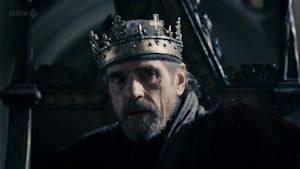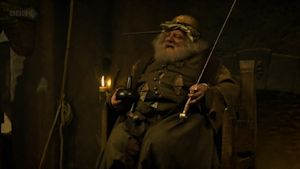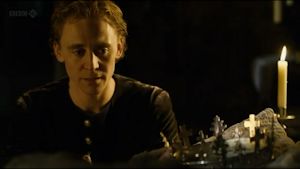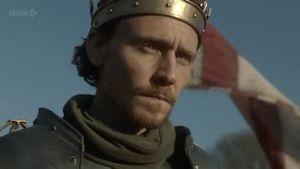TV Review: The Hollow Crown - Page 2
Henry IV, Parts 1 & 2
 | | I'd be surprisingly okay with a King Jeremy Irons, as long as he gave lots and lots of public speeches |
Though they make up two different episodes of the series, the two parts of Henry IV are treated here as one continuous story. They are both adapted and directed by the same man, they both share the same style and tone, and there are subtle clues throughout the first part that are not necessarily part of Shakepeare's original text that foreshadow events in the second part. And though these plays are named after King Henry IV (Jeremy Irons), they are really the story of Prince Hal, the future King Henry V, masterfully played here by Tom Hiddleston. It's a notoriously tricky role to get right, because the prince has to be jovial enough to hang out at the Eastcheap bawdy house but also serious enough to vanquish Hotspur at the Battle of Shrewsbury, take the throne with honor, and renounce the much-beloved Falstaff. Hiddleston embraces Hal's mischievious side, but he always manages to maintain that underlying seriousness, never able to completely hide the knowledge of what he must eventually become.
A perfect example is an early scene at Eastcheap in which Hal and Falstaff take turns pretending to be King Henry IV. The scene starts with all laughs and good times, mostly at Falstaff's expense (and helped in no small part by Hiddleston's awesome impersonation of Jeremy Irons), but it takes a sudden turn when Falstaff, pretending to be the prince pleading with his father not to banish his friend, delivers his "banish Falstaff and banish all the world" speech. The prince, pretending to be the king, says he will banish Falstaff, but Hiddleston delivers the line with a stab of deep remorse, foreshadowing how Hal, as king, will eventually banish Falstaff. There are cracks in Hal's apparent wildness that Hiddleston is able to demonstrate to the audience in such a way that it remains obscured to the characters around him, and that's an impressive feat.
 | | Alas, Beale's Falstaff leaves much to be desired |
Unfortunately, Simon Russell Beale's portrayal of Falstaff isn't as impressive, though it's not entirely Beale's fault. There are a few directorial choices--such as having Falstaff's long aside about honor be delivered as a voice-over internal monologue that is deathly serious instead of a moment of cheek with the audience--that push Falstaff too far away from the lovable rogue he is often seen as and into a more pathetic and less sympathetic character. When Falstaff is rejected by Hal in the end, it is still heart-wrenching, but it's not as powerful in this adaptation as it is in ones where Falstaff is more endearing.
The only other major acting worth noting is Jeremy Irons' Henry IV. You'd be hard pressed to find a more drastically different version of Henry from Rory Kinnear's underplayed one from "Richard II," but that's wholly appropriate. King Henry IV doesn't get a great deal of time on stage compared to Hal and Falstaff, but his presence looms over everything, with his troubled relationship with Hal being central to the emotional heart of the two plays. Therefore, having an actor with gravitas who is incapable of hiding in the background, such as Jeremy Irons, is essential. Irons plays him as a bitter man who is quick to anger and to feel remorse, but who still holds on to his humanity through his family and his duty to defend the crown. His final confrontation with Hal, right before his death, is an extremely impressive and powerful scene, probably the best scene in the whole of this adaptation.
 | | Here, Tom Hiddleston is seen contemplating whether or not he should steal the show |
Still, these two episodes aren't as epic or interesting from a filmmaking point of view as "Richard II." Gone is the intense focus on symbolism, the vibrant colors, the beautifully elaborate sets, and the soaring romantic score, replaced with a more monochromatic pallette, more time spent indoors, and a forgettable collection of stock music. Even the crown is duller, suddenly lacking all of its sparkling jewels. A lot of this is attributable to the more down-to-earth nature of the text and characters, but it overburdens these episodes, ultimately making them less impactful. The textual adaptation is also more uneven here, with questionable cuts in some places and drawn-out scenes that should have been simplified in others. There are many individual scenes throughout "Henry IV" that are incredibly well-done, but as a whole, its nowhere near as strong as "Richard II."
Henry V
 | | And here, we see him stealing the show |
Forget Richard II and Henry IV. The most important play in the tetralogy is, without question, Henry V, and any attempt to put it on film is destined to be compared to both Laurence Olivier's and Kenneth Branagh's adaptations. Those two earlier masterpieces treated the play differently, with Olivier--cognizant of what was a current event at the time, World War II--focusing on the triumphant call to arms and Branagh--recalling the more muddy and morally ambiguous wars of the second half of the Twentieth Century--spending more time looking at the brutality of war. Both of these interpretations are valid, from a textual point of view, but this version of Henry V bucks convention by doing its best to ignore the modern world and allow both interpretations to shine. For the most part, it threads the needle perfectly, though it does lean more in Branagh's direction.
This episode returns to the playful cinematography, bright colors, and attention to symbolism from "Richard II," along with a more dramatic and epic score. With John Hurt acting as the Chorus, narrating the action (and eventually revealed to be the grown-up boy from the play, an ingenious plot twist), and with the entire story bookended by Henry's funeral, this adaptation feels like a war fable. Therefore, the return to a more fantastical film approach works, but it never gets as heavy-handed as "Richard II."
-e. magill 1/29/2013
|
|